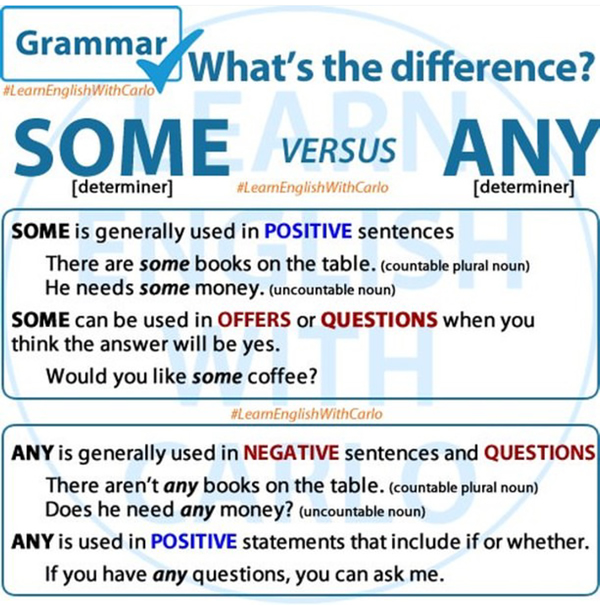As an English learner, you’ve probably come across some and any and wondered why we use one instead of the other. These two words have very similar meanings—they both refer to an unspecified amount or number—but their usage depends on the context. Let’s explore the differences with simple rules, examples, and tips.

Key Differences Between SOME and ANY
1. SOME
- Used in Positive Statements
Some is typically used in affirmative (positive) sentences.- I have some friends in New York.
- She bought some bread at the store.
- Used in Offers and Suggestions
When making an offer or suggestion, we use some because we expect the answer to be “yes.”- Would you like some coffee?
- Can I get you some water?
- Used in Certain Questions
In questions where the speaker expects a positive response, some is used.- Did you buy some apples? (The speaker assumes the answer is likely “yes.”)
2. ANY
- Used in Negative Statements
Any is commonly used in negative sentences.- I don’t have any money.
- She didn’t see any birds in the park.
- Used in Questions
In general questions, any is preferred because the speaker isn’t sure about the answer.- Do you have any siblings?
- Is there any milk in the fridge?
- Used in Positive Statements with “Whether” or “If”
When the sentence starts with “whether” or “if,” any is used.- Let me know if you need any help.
- I’m not sure whether she has any information about the meeting.
Quick Comparison Table
| SOME | ANY |
|---|---|
| Positive statements | Negative statements |
| I need some paper for the printer. | I don’t need any paper for the printer. |
| Offers or suggestions | General questions |
| Would you like some tea? | Do you have any tea? |
| Expected positive answers in questions | Neutral or unsure answers in questions |
| Did you get some cookies? | Did you find any cookies? |
Tips to Remember
- Think of positivity vs. uncertainty: Use some when you’re confident or positive and any when you’re unsure or negative.
- Offers and requests lean toward “some”: If you’re being polite or expect agreement, go with some.
- Watch out for “if” and “whether”: When these words start a clause, any is your go-to choice.

1 comment
THANK YOU